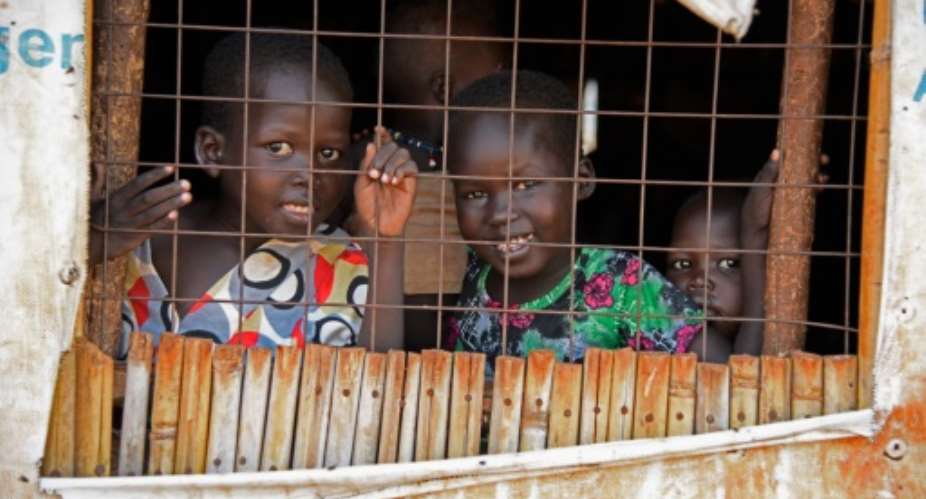Adjumani (Uganda) (AFP) - Kneeling on the floor of a large, dimly-lit communal tent Filippo Grandi, the UN's most senior official for refugees, listens intently as Richard Lagu describes his difficult living conditions.
The two men speak frankly.
"It's not comfortable at all here, there's not enough water and the food is not good," says Lagu.
The 22-year-old fled a recent outbreak of fighting in South Sudan, escaping to Uganda on July 24 with his sisters and their children.
The eight of them now share a crowded UN tent with another two households, in a transit centre for new arrivals.
"You are safe here, but you have to be patient," says Grandi. "Everyone is here to help. Good luck," says Grandi as the two men shake hands.
 While Uganda is praised for welcoming the refugees, the international community has failed to provide the money needed to help the country cope with this latest emergency
While Uganda is praised for welcoming the refugees, the international community has failed to provide the money needed to help the country cope with this latest emergency
Lagu fled after soldiers broke into his home threatening to kidnap and kill his family, and now a refugee in a foreign country he, like nearly 90,000 who have crossed the border in recent weeks, faces an uncertain future.
While Uganda is praised for welcoming the refugees, the international community has failed to provide the money needed to help the country cope with this latest emergency.
It's not a humanitarian disaster, Grandi says, at least not yet.
"I'm really worried about the overcrowding," says Grandi, "because overcrowding is what creates an environment for epidemics and diseases."
Survive and thrive
After talking with Lagu at the Nyuamanzi Transit Centre, Grandi travelled a short distance to Pagarinya Settlement where more than 22,000 refugees have each been given a plot of land to cultivate alongside local residents. The new camp was full just two weeks after opening, as people continued to flee South Sudan's chaos.
As he arrived, dancers in traditional clothes sang welcome songs to the rhythm of a drummer beating an old yellow jerry can with a stick. Women set the tempo by rubbing metal plates against green plastic bead necklaces.
 UN High Commissioner for Refugees Filippo Grandi, pictured on August 24, 2016, responded that he is confident many of the issues with Ugandan refugee camps can be addressed, but the numbers still continue to rise
UN High Commissioner for Refugees Filippo Grandi, pictured on August 24, 2016, responded that he is confident many of the issues with Ugandan refugee camps can be addressed, but the numbers still continue to rise
Peter Gai Tek, a history and English teacher in the South Sudan capital Juba before he became a refugee, read a list of the people's simple desires: "We want our children to be educated, to open schools, and also our health condition to be improved."
Grandi responds that he is confident many of the issues can be addressed, but the numbers still continue to rise and Uganda's government is finding it increasingly hard to cope.
"Uganda has faced troubles and we have been refugees in the past," says Hilary Onek, the country's minister for refugees.
"Now that we have come back home we understand the suffering of other people who are tortured in their countries... we have sympathy for them."
Such fellow-feeling is rare in Europe where a siege mentality has taken hold in the face of thousands fleeing conflict and hardship in the Middle East, Africa and elsewhere.
But here in poor, rural northern Uganda Onek says the refugees must be welcomed and offered the opportunities to survive, and to thrive.
"You don't leave refugees idle. We want to turn them into a productive force," he says.
"Giving them skills increases their purchasing power in our economy and they can bring their skills back to their host country."





 Dumsor: Mathew Opoku Prempeh has been disrespectful, he should be fired – IES
Dumsor: Mathew Opoku Prempeh has been disrespectful, he should be fired – IES
 NPP prioritizing politics over power crisis solution — PR Strategist
NPP prioritizing politics over power crisis solution — PR Strategist
 E/R: Gory accidents kills 3 persons at Aseseaso, several others critically injur...
E/R: Gory accidents kills 3 persons at Aseseaso, several others critically injur...
 Nobody can come up with 'dumsor' timetable except Energy Minister – Osafo-Maafo
Nobody can come up with 'dumsor' timetable except Energy Minister – Osafo-Maafo
 Dumsor: You ‘the men’ find it difficult to draw timetable when ‘incompetent’ NDC...
Dumsor: You ‘the men’ find it difficult to draw timetable when ‘incompetent’ NDC...
 We’re working to restore supply after heavy rains caused outages in parts of Gre...
We’re working to restore supply after heavy rains caused outages in parts of Gre...
 NPP government plans to expand rail network to every region — Peter Amewu
NPP government plans to expand rail network to every region — Peter Amewu
 Dumsor must stop vigil part 2: We’ll choose how we demonstrate and who to partne...
Dumsor must stop vigil part 2: We’ll choose how we demonstrate and who to partne...
 2024 elections: NDC stands on the side of morality, truth; NPP isn't an option —...
2024 elections: NDC stands on the side of morality, truth; NPP isn't an option —...
 Akufo-Addo has moved Ghana from 'Beyond Aid' to ‘Beyond Borrowing’ — Haruna Idri...
Akufo-Addo has moved Ghana from 'Beyond Aid' to ‘Beyond Borrowing’ — Haruna Idri...
